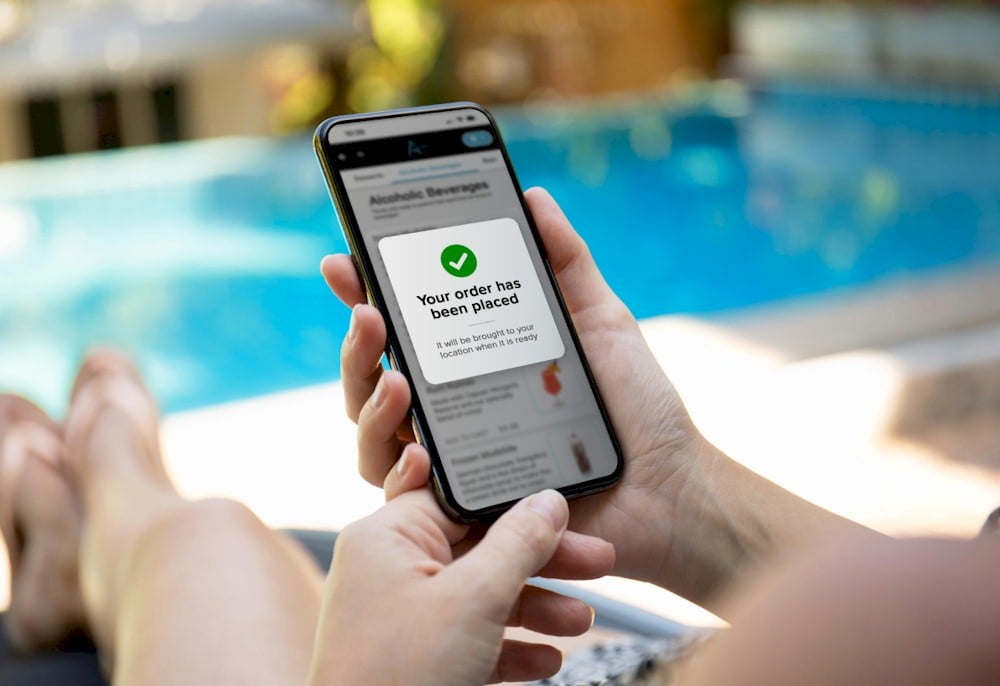How to Deliver a Frictionless Experience at Six Key Stages of the Guest Journey

Elevating the Guest Experience
The hospitality industry has witnessed an explosion in technology that has transformed the way properties engage with guests. From a proliferation of mobile apps and chatbots to self-service options for everything from check-in to food ordering, change is the order of the day.
Every touchpoint in the guest journey is an opportunity to provide a hospitality moment, which ensures a frictionless experience but also improves guest interactions. The name of the game is to create memorable experiences, beginning well before the guest’s arrival date and extending beyond check-out.
Yet challenges are present at every stage, and disappointed guests don’t return. According to a recent customer loyalty survey conducted by global accounting firm PwC, more than 25 percent of respondents said they stopped buying from a specific business in the past year due to negative experiences. That percentage was even higher for several types of hospitality businesses, including airlines, hotels and restaurants. Even a single bad experience can result in negative reviews on social media that can result in a loss of customers and tarnish the property’s reputation.
The goal is to deliver a zero disappointment experience, which requires hotels to invest in innovative technology solutions and develop a comprehensive technology strategy that addresses six critical interactions in the guest experience: Booking, check-in, service, food and beverage, check-out, and post-experience. Each stage in the journey provides opportunities to turn guests into brand champions. Properties that get it right will reap the rewards-repeat visits, more referrals, positive reviews, and increased revenue.
Booking
The first key interaction is booking, which begins well before travelers leave their homes. This sets the tone for the entire visit and gives the property a chance to create goodwill and increase profitability. The entire process needs to be comprehensive, flexible, and personal.
Convenience is a top consideration. More than anything, consumers want the booking process to be streamlined and user-friendly. They are accustomed to technology experiences that present everything they need in a single view, so booking needs to mirror that ‘single pane’ experience.
Adopting a mobile-first approach will help, as travelers increasingly research properties and book reservations through their smartphones and other mobile devices. Be sure content is delivered on demand. If response times are slow, consumers will become frustrated and go elsewhere.
Additionally, since people tend to shop around before booking, offer an incentive to book. A free room upgrade, a restaurant discount, or extra loyalty points can make the difference in whether or not lookers become bookers.
Keep in mind, too, that travelers want personalized experiences and expect a choice of accommodation types and activities. Robust booking systems enable hotels to retain guest history data and synchronize information from multiple sources so that prospective guests receive relevant offers and suggestions-such as golf outings, spa visits and show tickets-that make their trip unique. Consumers increasingly want to book an experience, not just a room.
Customer support is also important during the booking process. Travelers expect accessible and responsive support and value the availability of assistance, whether through online chat, email or phone.
Lastly, consumers want clear cancellation and refund policies. With the unpredictability surrounding travel in a post-pandemic environment, guests want to know the process for modifying or canceling bookings as well as guidelines on refunds and change fees. Make sure that information is transparent and available.
Check-In
The next key hospitality interaction is arrival and check-in. The process needs to be fast and line-free. Although some guests prefer the traditional front desk, many others want to check in via a kiosk or mobile app and bypass the lobby altogether. In fact, increasing numbers of guests choose ‘mobile everything’, from check-in and room keys to payments and check-out. With an increasing number of industries serving consumers through all-digital experiences, it is vital to accommodate travelers who prefer this technology.
At larger properties in particular, where the front desk is busy and wait times can be long, queue-busting kiosks are also a must. The technology should be intuitive and easy to use, with interfaces that provide clear step-by-step instructions. Make sure staff members are available to assist guests who need extra help. Ideally, front desk employees should be trained to help guests who encounter difficulties.
During the check-in process-whether via front desk, kiosk, or mobile app-present guests with upgrades and add-ons, such as larger rooms, spa appointments, and restaurant reservations. Mobile and kiosk customers need to be able to view upgrades, confirmation numbers, and offer codes as well as obtain their room keys quickly and easily.
Clearly communicate the property’s check-in options during the booking process and prior to check-in. This information should be displayed on the website as well as conveyed in confirmation emails and via other communication channels.
Additionally, highlight the benefits of using technology-based check-in options. Explain how mobile and kiosk check-in can save time and streamline the process. Guests who are hesitant to use this technology will be more inclined to try it if they are provided with information on its advantages.
Finally, stay up-to-date with the latest trends and consumer preferences. Properties that want to remain competitive must evolve and adapt. As technology advances and guest preferences change, be prepared to introduce enhancements-or even entirely new options-to the check-in process.
Service
Moments in which guests request and receive service are increasingly important in driving satisfaction, with travelers demanding access to services at any time, in any place, and via any device.
Indeed, mobile-first interactions between customers and companies in non-hospitality market sectors have reshaped today’s consumer expectations, creating an ‘always on’ mentality. Hospitality service systems should mirror these mobile-first experiences, allowing guests and staff to communicate in real-time via text message or chat. It’s both practical and convenient, as it enables staff to respond directly and quickly to guest needs, which elevates service and makes travelers feel valued.
In service moments, personalization is especially important and technology plays an enormous role. With the right solutions, properties can track and store a multitude of customer information-from room preferences and gift shop purchases to birthdays and anniversaries-which can be used to provide highly curated guest stay experiences.
It should come as no surprise that personalization drives performance and better customer outcomes. According to a recent study by global management consulting firm McKinsey & Company, personalization typically drives a 10 percent to 15 percent revenue lift; the more skillful a business becomes in applying data to build customer intimacy, the greater the returns. Moreover, 71 percent of consumers expect companies to deliver customized interactions; and 76 percent get upset when they don’t receive the personal service they anticipated. Consumers don’t just want personalization, they demand it.
Over time, personalization is especially effective at driving repeat business. Recurring interactions create more data from which properties can design more relevant experiences, creating a flywheel effect that generates guest value and loyalty.
There’s no better way for properties to upstage the competition than to deliver personalized service. It creates more satisfied guests in the short run; and, more importantly, builds lasting customer relationships and long-term profitability.
Food & Beverage
Moments in which guests interact with food and beverage services are vital to get right. Consumer expectations in these moments are high and have been shaped both by the pandemic and a variety of other market sectors.
More than anything, guests crave convenience and immediacy in food and beverage service. Grab-and-go, food lockers, on-demand ordering and delivery, and self-service check-out all serve this expectation. Some guests want to use their own devices to view dynamic menus that show photos of food and beverage selections; others want the ability to order in non-traditional settings, such as poolside or from a beach cabana.
When it comes to F&B payment options, it’s all about choice. Contactless and cashless transactions are quickly becoming the norm, with many customers using mobile wallet payment services, such as Apple Pay and Google Pay, in addition to contactless credit and debit cards and other digital payment options. In international travel scenarios, travelers want multicurrency support and transparent conversion rates.
Secure payment processes are also a must. Consumers trust that their payment details will be handled securely by the property. Similarly, they appreciate transparency in pricing, with charges and fees clearly communicated.
Additionally, guests enrolled in hotel loyalty programs want to earn and redeem rewards through the F&B payment process. Integration allows for a seamless experience where points and rewards are automatically applied or tracked during food and beverage transactions.
Forward-looking hospitality venues are quickly moving beyond basic point-of-sale systems to embrace cutting-edge F&B solutions that drive efficiency and growth. The right technology can transform food and beverage operations, enabling properties to streamline workflows, boost guest satisfaction, ease the burden of labor shortages and improve profit margins.
Check-Out
All the perfect moments a property has created throughout a guest’s stay will be undone if departure and check-out moments are sub-par. Similar to the check-in, choice is key. Some guests prefer a traditional check-out experience while others want mobile or kiosk options with no front desk stop required. Either way, check-out should be quick and easy.
With the increasing reliance on smartphones, guests appreciate the convenience of mobile check-out, which enables them to complete the entire process through the property’s mobile app or a web-based interface. They can review charges, settle bills securely, and receive an electronic receipt-all without standing in line.
Similarly, self-service kiosks provide an alternative to traditional front desk check-out service and can be deployed in high-traffic areas such as lobbies and elevator banks. Kiosks allow guests to view their folios, check out, and receive an electronic receipt without staff interaction.
Be sure to inform guests of the available check-out options during the booking process. Also, include any instructions or procedures specific to each method so that guests can plan accordingly.
The bottom line: Every traveler wants a stress-free check-out. The right technology can help properties achieve streamlined check-out experiences and more satisfied guests as a result.
Post-Experience
The final interaction that needs to be elevated is the post-experience. Just because guests have checked out doesn’t mean the interaction with them ends. In fact, now is the time to inform them of upcoming specials and promotions, send post-visit surveys, and ask them to refer friends and family.
Encourage repeat visits and positive reviews with personalized campaigns based on guests’ past experiences. Avoid generic marketing, as consumers expect offers to appeal to their individual needs and interests. Also, acknowledge special dates, such as anniversaries and birthdays, perhaps even the date the guest first stayed at the hotel.
It’s also important to recognize returning guests with a flexible loyalty program that gives them choices for accumulating and redeeming points. A recent survey by global accounting firm PwC found that consumers prize flexibility in rewards programs, with one of the top preferences being ‘rewards my way’. Likewise, provide meaningful offers to loyalty program members, such as discounted rates, room upgrades, complimentary services, or exclusive access to amenities.
Additionally, encourage customers to provide feedback, perhaps in exchange for loyalty points or rewards. Post-experience surveys not only enrich guest profiles but also shape future offers. Moreover, consumers enjoy rewarding organizations that reward them. Tying feedback to loyalty programs and special promotions helps forge long-lasting guest relationships.
As is the case in every other phase of the guest journey, technology is critical in the post-experience stage. Email and SMS marketing campaigns allow hotels to send personalized communications to guests after their stay. And systems that gather guest feedback and analyze customer data enable properties to gain valuable insights and use that information to encourage future visits.
In short, properties that leverage post-experience technology wisely will create goodwill, encourage repeat business, and boost profitability.
Reprinted from the Hotel Business Review with permission from http://www.hotelexecutive.com/.
About Agilysys
Agilysys exclusively delivers state-of-the-art hospitality software solutions and services that help organizations go beyond what they can accomplish with traditional property management systems (PMS), point-of-sale (POS) solutions and food and beverage inventory and procurement systems. Modern, state-of-the-art solutions work standalone to provide best-in-class capabilities, or together in a coordinated ecosystem that unifies data and workflows across a property, to equip staff members to delight guests, improve efficiency and grow margins. www.agilysys.com





